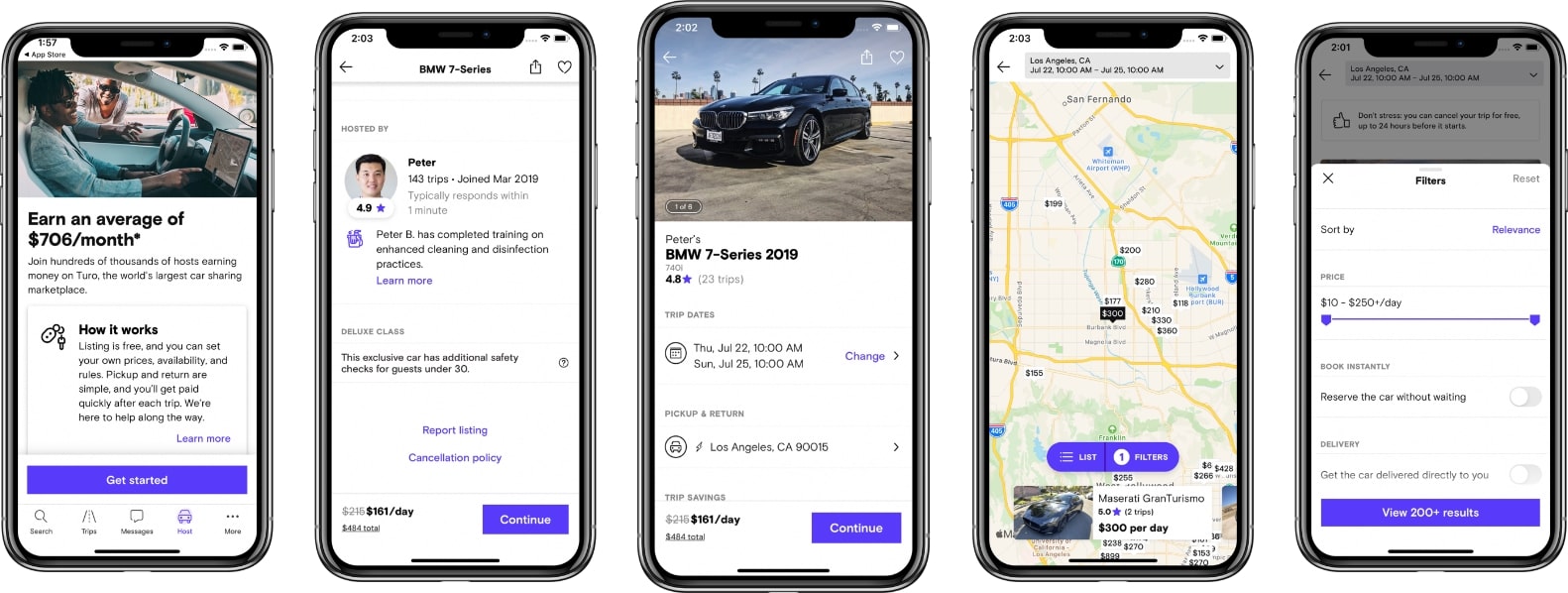Turo Extend Trip, Your Guide
Turo Extend Trip: Need more time with your Turo rental? Extending your trip can be a breeze, but it’s crucial to understand the process, costs, and communication involved. This guide walks you through everything you need to know, from requesting an extension to navigating potential challenges and alternative solutions.
We’ll cover the step-by-step process of requesting an extension, the factors influencing approval, and the costs and fees involved. We’ll also explore effective communication strategies with your Turo host, address potential legal aspects, and offer solutions if your request is denied. Finally, we’ll discuss the impact on your insurance coverage and how to plan ahead to avoid surprises.
Understanding Turo Trip Extensions
Extending your Turo trip is often straightforward, but understanding the process and associated costs is crucial for a smooth experience. This section details the step-by-step procedure, factors influencing approval, and variations in extension policies across different listings.
The Turo trip extension process involves a request from the renter to the host, followed by a review and approval (or denial) by the host. The process is managed through the Turo app or website.
Turo Trip Extension Process

- Initiate the Request: Through the Turo app or website, locate the option to extend your trip. This is usually found within your current booking details.
- Specify the Extension: Indicate the desired number of additional days you need the vehicle.
- Review Proposed Costs: Turo will calculate the additional cost based on the daily rate and any applicable fees.
- Host Approval: The request is sent to the host for approval. They have the final say in whether to grant the extension.
- Confirmation (or Rejection): You will receive notification from Turo about the host’s decision. If approved, the extension is added to your booking.
Factors Influencing Extension Approval
Several factors influence a host’s decision to approve an extension request. These include the host’s availability, upcoming bookings, vehicle maintenance needs, and the renter’s history on the platform. A positive rental history and prompt communication significantly improve the chances of approval.
Comparison of Extension Policies
Extension policies vary depending on the individual host and vehicle listing. Some hosts may have stricter policies than others, while some may not allow extensions at all. Always check the specific terms and conditions of the listing before booking. Some listings may even pre-approve a certain number of extension days.
Costs and Fees Associated with Extensions
Extending a Turo trip involves additional costs beyond the initial rental agreement. Understanding these costs is essential to avoid unexpected expenses.
Typical Cost Structure
The cost of an extension is typically calculated based on the vehicle’s daily rental rate, as specified in the original booking. This daily rate may vary depending on factors like demand and the vehicle’s popularity.
Planning a getaway? If you’re in the Bay Area, check out some amazing options for unique day trips; you can find some great ideas on this website: unique day trips from the bay area. Alternatively, for a truly stunning European adventure, consider a trip to Austria. A Vienna to Hallstatt day trip offers breathtaking scenery and charming towns, a perfect escape from the everyday.
Both options promise memorable experiences, depending on your preferred travel style and location.
Additional Fees
Beyond the daily rate, additional fees might apply. These can include taxes, cleaning fees (if applicable), and potentially late fees if the extension request is made very close to the original return date.
Hypothetical Cost Scenario
Let’s say a vehicle has a daily rate of $50, and a renter extends their trip by 3 days. Assuming a 10% tax rate and a $20 cleaning fee, the total extension cost would be (3 days
- $50) + (3 days
- $50
- 0.10) + $20 = $150 + $15 + $20 = $185.
Communicating with the Turo Host Regarding Extensions
Effective communication with the host is crucial for a successful trip extension.
Sample Email Template
Subject: Trip Extension Request – [Your Name]
- [Vehicle Make and Model]
- [Booking ID]
Dear [Host Name],I am writing to request an extension on my current Turo rental, booking ID [Booking ID], for [Vehicle Make and Model]. I would like to extend my trip by [Number] days, until [New Return Date]. Please let me know if this is possible.Thank you for your time and consideration.Sincerely,[Your Name]
Best Practices for Communication
Communicate your request well in advance of your original return date. Be polite, clear, and concise in your communication. Provide ample notice to allow the host sufficient time to respond.
Addressing Communication Challenges
If the host doesn’t respond promptly, follow up politely but persistently. If the extension is denied, explore alternative solutions (discussed in a later section).
Terms and Conditions of Trip Extensions
Understanding the terms and conditions related to trip extensions is vital to avoid disputes.
Key Terms and Conditions
Review the original rental agreement and any additional terms specified by the host regarding extensions. Pay close attention to clauses related to cancellation policies, additional fees, and insurance coverage during the extended period.
Renter’s Rights and Responsibilities
The renter retains responsibility for the vehicle’s safe operation and condition throughout the extended rental period. They must adhere to all traffic laws and report any accidents or damage promptly.
Potential Risks and Mitigation
Potential risks include unexpected mechanical issues, accidents, or changes in the host’s availability. Mitigating these risks involves regular vehicle checks, responsible driving, and open communication with the host.
Alternative Solutions if Extension is Denied: Turo Extend Trip
If your extension request is denied, several alternatives exist.
Alternative Options
- Find a New Rental: Use Turo or other car rental services to find a replacement vehicle.
- Adjust Your Itinerary: Shorten your trip or alter your plans to accommodate the original return date.
- Use Public Transportation: Consider alternative transportation methods, such as public transit or ride-sharing services.
Comparing Alternatives, Turo extend trip
Each alternative has advantages and disadvantages. Finding a new rental might be costly, while adjusting your itinerary could limit your travel plans. Public transport may be inconvenient depending on your destination.
Decision-Making Flowchart
(A visual flowchart would be included here, illustrating the decision-making process based on factors such as budget, time constraints, and destination accessibility. This would be a visual representation guiding the user through the options based on their specific circumstances.)
Impact of Trip Extensions on Insurance Coverage
Trip extensions can impact insurance coverage.
Insurance Coverage
Turo’s insurance coverage typically extends to the duration of the rental, including approved extensions. However, it’s crucial to confirm this with Turo directly to avoid any gaps in coverage.
Maintaining Adequate Insurance
Ensure you understand the scope of coverage during the extended period. Contact Turo’s customer support if you have any questions or concerns.
Insufficient Coverage Scenarios
Insufficient coverage might arise if the extension is not properly documented or approved through the Turo platform. Always obtain confirmation from Turo before assuming coverage extends automatically.
Turo’s Role in Facilitating Trip Extensions
Turo plays a central role in managing trip extensions.
Planning a getaway? If you’re in the Bay Area, check out some amazing unique day trips from the bay area – there are tons of options, from wine country adventures to exploring stunning coastal towns. Alternatively, if you’re in Europe, a breathtaking option is a Vienna to Hallstatt day trip ; the picturesque Austrian village is well worth the journey.
Both offer fantastic escapes, depending on your location and preferences!
Turo’s Role (Renter & Owner Perspectives)
For renters, Turo provides the platform to request extensions and facilitates communication with the host. For hosts, Turo manages the approval process and ensures the extension is reflected in the booking details.
Turo’s Support Mechanisms
Turo offers customer support to assist with any questions or issues related to trip extensions. They can help clarify policies, resolve disputes, and provide guidance throughout the process.
Successful Extension Narrative
(A narrative would be included here describing a positive experience with a Turo trip extension, focusing on the process and emotions involved, without specific details of the trip itself. The narrative would highlight the ease of the extension process, positive communication with the host, and the overall successful outcome. The focus is on the emotional aspects of a positive extension experience.)
Planning for Potential Trip Extensions

Proactive planning can minimize stress if an extension becomes necessary.
Pre-Trip Extension Checklist
- Review the host’s extension policy.
- Assess the likelihood of needing an extension.
- Communicate potential extension needs to the host before the trip begins.
- Understand the potential costs associated with an extension.
Pre-Trip Planning Strategy
Incorporate potential extension needs into your travel plans. Have alternative arrangements in place if the extension request is denied.
Proactive Communication Benefits
Communicating extension needs proactively gives the host time to consider the request and potentially accommodate it. This reduces the risk of last-minute issues.
Legal Aspects of Trip Extensions
Understanding the legal implications of trip extensions is essential.
Potential Legal Implications

Extensions should be documented and agreed upon by both the renter and host. Any disputes should be handled through Turo’s dispute resolution process.
Reviewing the Rental Agreement
Review the rental agreement carefully before and after requesting an extension to ensure you understand all terms and conditions.
Responsibilities in Case of Disputes
Both renter and owner have responsibilities in case of disputes. It’s crucial to follow Turo’s dispute resolution process and maintain thorough documentation.
Extending your Turo trip can be a simple way to enjoy your journey longer, but careful planning and clear communication are key. By understanding the process, costs, and potential challenges beforehand, you can confidently navigate any extension request and ensure a smooth and enjoyable rental experience. Remember to always review the rental agreement and communicate proactively with your host. Happy travels!
Share this content:

